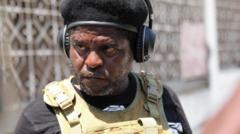Recent attacks in Colombia highlight escalating violence and security challenges as elections approach.
**Colombian Security Crisis Intensifies with Fatal Attacks**

**Colombian Security Crisis Intensifies with Fatal Attacks**
At least 18 fatalities reported following coordinated assaults in Cali and near Medellin.
The nation of Colombia faces a profound security crisis after two devastating attacks left at least 18 people dead and numerous others wounded, escalating fears about the stability of the region ahead of upcoming elections.
In the western city of Cali, a car bomb explosion claimed the lives of six people and injured more than 60 others. This attack targeted a busy street close to the Marco Fidel Suarez Military Aviation School. Eyewitness accounts described a "thunderous" sound of explosion that rocked nearby neighborhoods, causing significant damage to residential structures.
Earlier that day, a drone assault on a police helicopter in a rural part of the northwestern region near Medellin resulted in the deaths of 12 police officers. The helicopter was reportedly on a mission to eradicate coca crops, the precursors for cocaine, at the time. The government has attributed these violent acts to various dissident factions of the now-defunct Revolutionary Armed Forces of Colombia (FARC).
In response to the escalating violence, Cali's mayor, Alejandro Eder, declared martial law in the city while enforcing a temporary prohibition on the entry of large trucks. He urged citizens to assist in the investigation by offering a reward for any valuable information.
Colombian President Gustavo Petro and military officials convened a security council meeting following these assaults, emphasizing a firm commitment to combat terrorism. Defense Minister Pedro Sánchez condemned the car bomb incident as a "terrorist attack" linked to narco cartel factions, specifically mentioning the "alias Mordisco," referring to the FARC leader Ivan Mordisco.
The attacks represent a worrying trend, as Colombia has seen a marked increase in violence recently, including confrontations involving dissidents and other armed groups. Notably, 2024 recorded over 115 drone strikes linked to illegal organizations. Heightened tensions and results from the ongoing conflict signal profound implications for the nation as it approaches its electoral season, with the government pledging to uphold safety and stability amid these challenges.
In the western city of Cali, a car bomb explosion claimed the lives of six people and injured more than 60 others. This attack targeted a busy street close to the Marco Fidel Suarez Military Aviation School. Eyewitness accounts described a "thunderous" sound of explosion that rocked nearby neighborhoods, causing significant damage to residential structures.
Earlier that day, a drone assault on a police helicopter in a rural part of the northwestern region near Medellin resulted in the deaths of 12 police officers. The helicopter was reportedly on a mission to eradicate coca crops, the precursors for cocaine, at the time. The government has attributed these violent acts to various dissident factions of the now-defunct Revolutionary Armed Forces of Colombia (FARC).
In response to the escalating violence, Cali's mayor, Alejandro Eder, declared martial law in the city while enforcing a temporary prohibition on the entry of large trucks. He urged citizens to assist in the investigation by offering a reward for any valuable information.
Colombian President Gustavo Petro and military officials convened a security council meeting following these assaults, emphasizing a firm commitment to combat terrorism. Defense Minister Pedro Sánchez condemned the car bomb incident as a "terrorist attack" linked to narco cartel factions, specifically mentioning the "alias Mordisco," referring to the FARC leader Ivan Mordisco.
The attacks represent a worrying trend, as Colombia has seen a marked increase in violence recently, including confrontations involving dissidents and other armed groups. Notably, 2024 recorded over 115 drone strikes linked to illegal organizations. Heightened tensions and results from the ongoing conflict signal profound implications for the nation as it approaches its electoral season, with the government pledging to uphold safety and stability amid these challenges.





















